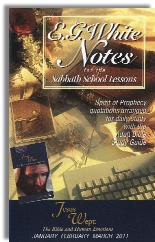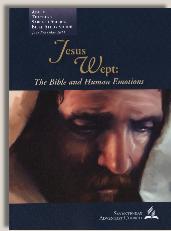|
||||||||||||||
Commentary on "Emotions"
Day 6: Thursday, December 30, 2010 - God's Plan for Painful Emotions
Overview
The lesson asks us to read John 16:20-24 and offers the following bullet points as a summary of the passage:
- The word seems to be full of joy.
- Grief, sorrow, and anguish will turn to joy.
- Past pan will be forgotten.
- No one will take away our joy.
- There will be no needs.
The conclusion asks us how we could “use Jesus’ promises to encourage someone in grief”.
Observations
For those of you who have not noticed how drastically Adventism takes Scripture out of context in order to use it to support their points, this lesson is a perfect example.
Following is the day’s text, John 16:20-24, quoted in the larger context of the surrounding verses:
[5] But now I am going to him who sent me, and none of you asks me, ‘Where are you going?’ [6] But because I have said these things to you, sorrow has filled your heart. [7] Nevertheless, I tell you the truth: it is to your advantage that I go away, for if I do not go away, the Helper will not come to you. But if I go, I will send him to you. [8] And when he comes, he will convict the world concerning sin and righteousness and judgment: [9] concerning sin, because they do not believe in me; [10] concerning righteousness, because I go to the Father, and you will see me no longer; [11] concerning judgment, because the ruler of this world is judged.
[12] “I still have many things to say to you, but you cannot bear them now. [13] When the Spirit of truth comes, he will guide you into all the truth, for he will not speak on his own authority, but whatever he hears he will speak, and he will declare to you the things that are to come. [14] He will glorify me, for he will take what is mine and declare it to you. [15] All that the Father has is mine; therefore I said that he will take what is mine and declare it to you.
[16] “A little while, and you will see me no longer; and again a little while, and you will see me.” [17] So some of his disciples said to one another, “What is this that he says to us, ‘A little while, and you will not see me, and again a little while, and you will see me’; and, ‘because I am going to the Father’?” [18] So they were saying, “What does he mean by ‘a little while’? We do not know what he is talking about.” [19] Jesus knew that they wanted to ask him, so he said to them, “Is this what you are asking yourselves, what I meant by saying, ‘A little while and you will not see me, and again a little while and you will see me’? [20] Truly, truly, I say to you, you will weep and lament, but the world will rejoice. You will be sorrowful, but your sorrow will turn into joy. [21] When a woman is giving birth, she has sorrow because her hour has come, but when she has delivered the baby, she no longer remembers the anguish, for joy that a human being has been born into the world. [22] So also you have sorrow now, but I will see you again, and your hearts will rejoice, and no one will take your joy from you. [23] In that day you will ask nothing of me. Truly, truly, I say to you, whatever you ask of the Father in my name, he will give it to you. [24] Until now you have asked nothing in my name. Ask, and you will receive, that your joy may be full.
[25] “I have said these things to you in figures of speech. The hour is coming when I will no longer speak to you in figures of speech but will tell you plainly about the Father. [26] In that day you will ask in my name, and I do not say to you that I will ask the Father on your behalf; [27] for the Father himself loves you, because you have loved me and have believed that I came from God. [28] I came from the Father and have come into the world, and now I am leaving the world and going to the Father.”
[29] His disciples said, “Ah, now you are speaking plainly and not using figurative speech! [30] Now we know that you know all things and do not need anyone to question you; this is why we believe that you came from God.” [31] Jesus answered them, “Do you now believe? [32] Behold, the hour is coming, indeed it has come, when you will be scattered, each to his own home, and will leave me alone. Yet I am not alone, for the Father is with me. [33] I have said these things to you, that in me you may have peace. In the world you will have tribulation. But take heart; I have overcome the world.” (John 16:5-33 ESV)
This passage is not a statement about human pain in general, nor is it a statement of how God deals with general human pain. This passage is explicitly addressed to Jesus’ disciples and addresses His imminent death and resurrection followed closely by His ascension.
Jesus is telling His disciples that they will be grieving very soon because He will be crucified and will be buried. Their sorrow, however, will quickly turn to joy because He will rise from the dead. The metaphor of the woman suffering in childbirth but forgetting her pain when the child is delivered directly corresponds to the disciples’ pain upon Jesus’ death but their forgotten pain and subsequent joy when the raised body of Jesus is delivered to them from the tomb.
This passage is not addressing the “second coming”. It is specifically addressing His death, and resurrection and ascension. He is reassuring His disciples in advance, even before they know why, that when they find themselves grief-stricken in a few days, they will have His words to remember as the events of that weekend unfold. His words to them will be confirmation to them that all of the trauma of the crucifixion were not a surprise to God; in fact, they were God’s plan, and the disciples do not need to fear.
Moreover, the lesson states that this passage assures us that we will have no needs. Apparently the lesson author is interpreting this passage as referring to heaven, but this is clearly not the case. In fact, this interpretation directly contradicts the clear words of the passage:
[23] In that day you will ask nothing of me. Truly, truly, I say to you, whatever you ask of the Father in my name, he will give it to you. [24] Until now you have asked nothing in my name. Ask, and you will receive, that your joy may be full.
Jesus is telling His disciples that “in that day”, the day the He rises from the dead and inaugurates the New Covenant, having fulfilled all the shadows of the sacrifice for sin that God promises to Israel and the world, they will finally be able to ask for what they need. He points out that they have not asked Him for anything, but after He rises from death, the new, living way to the Father opened by His body will be in place (Heb. 10:20). From that day on, His disciples will be able to ask the Father directly for their needs.
Those who are in Christ, forgiven and made alive because of their trust and belief in the Lord Jesus and His shed blood, have a new relationship with the Father. Now they are adopted children and full heirs of God, joint heirs with Christ (Rom. 8:14-16). They ask the Father “in Jesus’ name”. This is not a formula for prayer; rather, it is a statement that we have the privilege of asking the Father directly because of the name of Jesus by which we are saved. Because of Jesus, we have access to the Father. Because we are in Christ we can ask the Father directly.
Contrary to the lesson’s statement that we will have no needs and will not need to ask, the passage state, “Ask and you will receive, that your joy may be full.”
This passage is not talking about heaven. It is talking about living as born-again Christ-followers in the New Covenant. Jesus’ words applied to the reality of being His disciples after His resurrection, not about some distant day when He returns. His words were for the here and now.
There are plenty of passages that tell us God redeems our sorrow and turns it to joy, but this passage is not one of them. This passage is specifically addressing the difference for His disciples between living before the cross and living after the resurrection. Jesus’ resurrection introduced an entirely new reality that had never before existed on earth: He introduced the new covenant and the reality of His followers being born again by the Holy Spirit. This reality would give His people permission to ask the Father for what they need;
Conclusion
- John 16:20-24 is not dealing with general human joy and sadness.
- John 16:20-24 directly addresses the new covenant which would be the new reality when Jesus arose from the dead.
- This passage does not say God’s people will have no needs; instead, it says they will ask the Father directly, not going through a mediator.
- The good news of John 16:20-24 is that because of Jesus’ death and resurrection, humanity has opened to it a new, living way to the Father: Christ’s body.
- Because of this new, living way, we can approach God directly because of Jesus, and we can ask for what we need.
- We are instructed to ask, and the promise is that we will receive when we ask according to God’s will—in Jesus’ name (meaning asking based on our identity in Christ).
- This passage is not a passage about emotions; it’s a passage about the transition from the old covenant to the new covenant through Jesus’ death and resurrection, and it outlines the way believers are to approach God because of Jesus’ completed work.
Copyright 2010 BibleStudiesForAdventists.com. All rights reserved. Revised December 28, 2010. This website is published by Life Assurance Ministries, Glendale, Arizona, USA, the publisher of Proclamation! Magazine. Contact email: BibleStudiesForAdventists@gmail.com.
The Sabbath School Bible Study Guide and the corresponding E.G. White Notes are published by Pacific Press Publishing Association, which is owned and operated by the Seventh-day Adventist church. The current quarter's editions are pictured above.
Official Adventist Resources
Standard Edition Study Guide Week 1
Teacher's Edition Study Guide Week 1
Easy Reading Edition Study Guide Wk 1
Search the Complete Published Ellen G. White Writings


